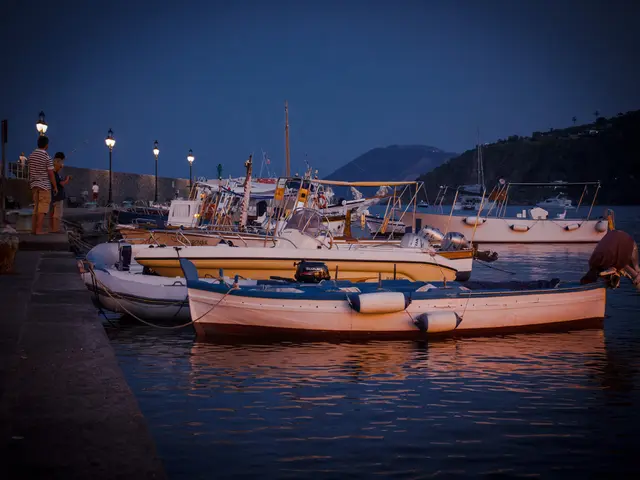Kickoff for the First Maltabiennale, Our Site's Showcase - Exhibition Viewed through a Local Lens
The inaugural edition of the 2024 Malta Biennale, held from March 13 to May 31, explored the Mediterranean from a unique insular perspective, guided by Malta's geographic isolation. This perspective offered fresh insights into the complex relationships between Southern Europe and Northern Africa, a convergence of East and West.
At the heart of this biennale was the understanding that an island is more than a solitary entity; it is a dynamic hub of composition, invention, and continuous exchange. Islands, by their very nature, foster relationships and connections across the sea, challenging traditional political and social narratives.
The "Space and Time" exhibition, held at the biennale's opening, exemplified this interplay between contemporary art and Malta's rich architectural heritage, creating a dialogue between the past and present. Malta, with its extensive maritime history and strategic position, embodies this concept. Throughout centuries, its natural harbors have been visited by numerous seafaring cultures, leaving an indelible impact on Maltese identity.
Promoted by Heritage Malta, the biennale was curated by Sofia Baldi Pighi, Elisa Carollo, and Emma Mattei. The curatorial team focused on the Mediterranean's cultural landscape, inherent in an interwoven tapestry of past narratives. Over 70 artists from around 30 countries participated, showcasing their work at 12 historical sites across Malta's cities. The main exhibition, titled "Insulaphilia," invited artists to engage with Malta's role as a nexus of North African, European, and Arab influences.
Migration, a significant theme throughout the biennale, underscores Malta's contemporary relevance amidst the ongoing migrant crisis. In 2023, approximately 34,000 migrants undertook perilous sea voyages to Malta, highlighting the island's critical position between continents.
One notable exhibit was the Ukrainian Pavilion "From South to North," which explored themes of imperial past and Russian aggression, linking Malta and Odessa. The pavilion was inaugurated with a video address by Ukraine's First Lady, Olena Zelenska.
The biennale was divided into four thematic sections: regional issues, facets of decolonization, political dimensions of the Mediterranean, and forms of resistance. The ethos of the biennale extended beyond the main exhibition, encompassing 12 national pavilions representing Austria, China, Franco-Germany, Italy, Malta, Palestine, Poland, Serbia, Spain, Turkey, and Ukraine. These pavilions fostered a participatory network across the Mediterranean, promoting exchange, vision, and collective transformation.
In its entirety, the Malta Biennale 2024 offered a Mediterranean expedition into the possibility of harmonious coexistence, encouraging a reevaluation of insularity not as isolation but as a profound source of connectivity and innovation.
In an interview, co-curators Sofia Baldi Pighi and Emma Mattei discussed the public's response to the biennale. While the initial reaction was mostly professional, the curators aimed to create a Biennale that appealed to anyone curious about art and Malta's cultural heritage. They also placed emphasis on the Biennale's role as a platform to share knowledge and awareness regarding cultural workers' rights.
Baldi Pighi and Mattei emphasized the significance of Malta's geographic isolation, which enabled the island to reflect global questions more clearly than larger, more densely populated areas. The Biennale's curatorial approach aimed to present insularity not as a barrier but as an observation point to pick up local issues reflecting global questions.
The Malta Biennale's inaugural edition appears to have garnered positive attention from local communities, cultural sectors, and international artists. The event's incorporation of Malta's rich heritage and contemporary art, combined with its unique location, promises to attract a diverse audience and generate conversation around the Mediterranean's cultural landscape.
- The Malta Biennale's unique insular perspective, guided by Malta's geographic isolation, explored complex relationships between Southern Europe, Northern Africa, and the East, offering fresh insights into these converging regions.
- The "Insulaphilia" exhibition, held at the Malta Biennale's opening, dialogued with Malta's architectural heritage, illustrating the dynamic hub of composition, invention, and continuous exchange that islands foster.
- With migrants undertaking perilous sea voyages to Malta, the biennale's focus on migration underscores Malta's contemporary relevance amidst the ongoing migrant crisis, highlighting its critical position between continents.
- The Malta Biennale 2024 aimed to create a platform not only for art and cultural heritage appreciation but also for sharing knowledge and advocating for cultural workers' rights, extending its ethos beyond the main exhibition to foster a participatory network across the Mediterranean.








